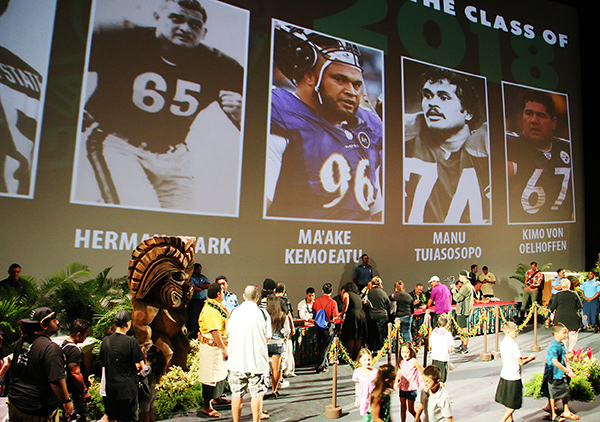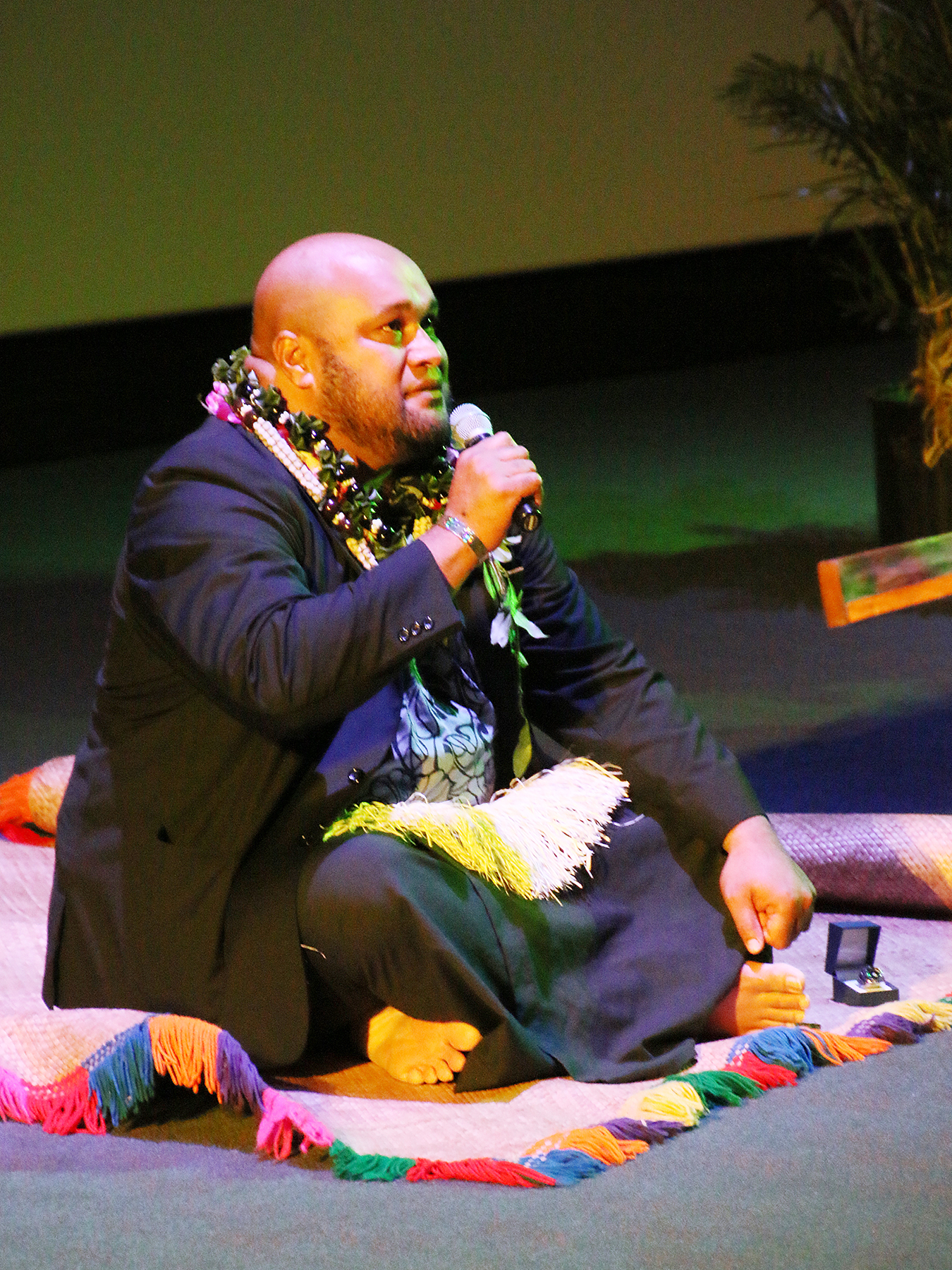
The Polynesian Football Hall of Fame Class of 2018 inductees sign autographs for fans at the Polynesian Cultural Center on Jan. 20, 2018. (PCC photo by Mike Foley)
Warrior heritage helps Polynesian athletes
There’s a line of thinking — a good one, it turns out — that modern Polynesians have channeled aspects of their ancient warrior culture and formidable physical prowess into becoming outstanding athletes.
Young Polynesians now excel in a wide variety of games and sports; and their parents and grandparents have been demonstrating this warrior-skills blend particularly well for over a century on rugby pitches, and starting about 80 years in American football. Today, can you imagine getting tackled by an amazingly quick, 300-plus-pound Polynesian defensive lineman?
Millions of fans, thousands of young players and their parents, and hundreds of coaches are working to bring up the latest generation of players to continue this trend; and for the past five years, the Polynesian Football Hall of Fame (PFHOF) has honored some of the earlier legendary stars of the game.
Touching, filled with gratitude and inspirational
On January 20 the organization enshrined five more members in the Class of 2018 into its permanent gallery at the Polynesian Cultural Center. Each of them were formidable athletes on the field, with awesome careers in pros, impressive stats and unbelievable replay highlights to back-up their selection credibility. That’s the exciting part of meeting the PFHOF Class of 2018 (see lead story Polynesian Football Hall of Fame enshrines Class of 2018) .
But there’s another amazing cultural characteristic of these retired professional football stars that also emerges during the enshrinement program:
They are men with tremendous respect and aloha for their islands, cultural heritage, families, coaches and teammates. Their remarks are not half-time go-get-em locker-room speeches: They’re touching, filled with gratitude and inspirational.
Some speak in their respective island languages. For example, Herman Clark Jr. started out speaking in Hawaiian on behalf of his father, who is descended from the chiefly lines of Maui and Moloka’i, and Manu Tuiasosopo launched his remarks in respectful oratorical Samoan; but it was Ma’ake Kemoe’atu — the 6’5” former 345-pound defensive tackle — who practically brought people to tears with his traditional Tongan-style response
Kemoe’atu responds Tongan style

Ma’ake Kemoe’atu during the Polynesian Football Hall of Fame enshrinement program at the Polynesian Cultural Center on Jan. 20, 2018. (PCC photo by Mike Foley)
He walked up carrying a Tongan pandanus-leaf mat, spread it out on the floor of the Hawaiian Journey Theater, took of his sandals and then sat down cross-legged in the old Polynesian way.
Speaking in Tongan, he thanked God, the leaders of the islands, the Polynesian Cultural Center, the other inductees, and and the PFHOF board “for being here, and for being inducted into the Polynesian Football Hall of Fame.”
“Please allow me to take off my shoes from my feet, sit on the floor and pay my respects to my elders, my ancestors, to my mom and my dad,” he continued. “They have given me the chance to pay my respects, because without them, I would not be here.”
He referred to them as the “source of my talent,” and spoke in a metaphor of his grandfather and ancestors planting a tree, “because they knew one day, their grandkids would be standing under that tree in its shade to protect them from the sun and keep them cool.”
‘The best investment is your children’
He thanked “all those who paved the way for me when I came here to America from Tonga” for planting that tree, Kemoe’atu said. “I want to thank the Polynesian Football Hall of Fame for continuing to plant that tree so future generations will stand under under it and be glorified in its shade, with all the many blessings that you will plant.”
“I always heard my father, a minister, tell the other adults in the church, the best investment you can make is in your children. Growing up, I didn’t understand the meaning of that, but now that I have my own two kids — a three-year-old daughter and a one-year-old boy — I understand the words of my dad that the best investment you can make is in your future.
Kemoe’atu thanked the Polynesian Cultural Center for “investing” in the lives of the students.” He thanked his mom, who’s “always been the cornerstone of the family, and for being here. I love you, mom. I also want to thank Nicole [his wife]: She has been wonderful taking care of our kids.”
Coaches, an ‘extension of mom and dad’
“I’m not sure if my coaches are here, but I want to thank them. You are an extension of mom and dad when these young kids come to you,” Kemoe’atu added, “and I want thank you for everything that you do and all the sacrifices that you’ve made for us.”
In response, Sikahema — the program emcee and PFHOF board member who’s also Tongan — thanked Kemoe’atu “for the way you represent our culture and our people. I’m grateful.”

Story by Mike Foley, who has been a full-time freelance writer and digital media specialist since 2002. Prior to that he had a long career in marketing communications, PR, journalism and university education. Foley learned to speak fluent Samoan as a Mormon missionary before moving to Laie in 1967 — and still does. He has traveled extensively over the years throughout Polynesia, other Pacific islands and Asia. Foley is mostly retired now, but continues to contribute to PCC and various other media.

Recent Comments